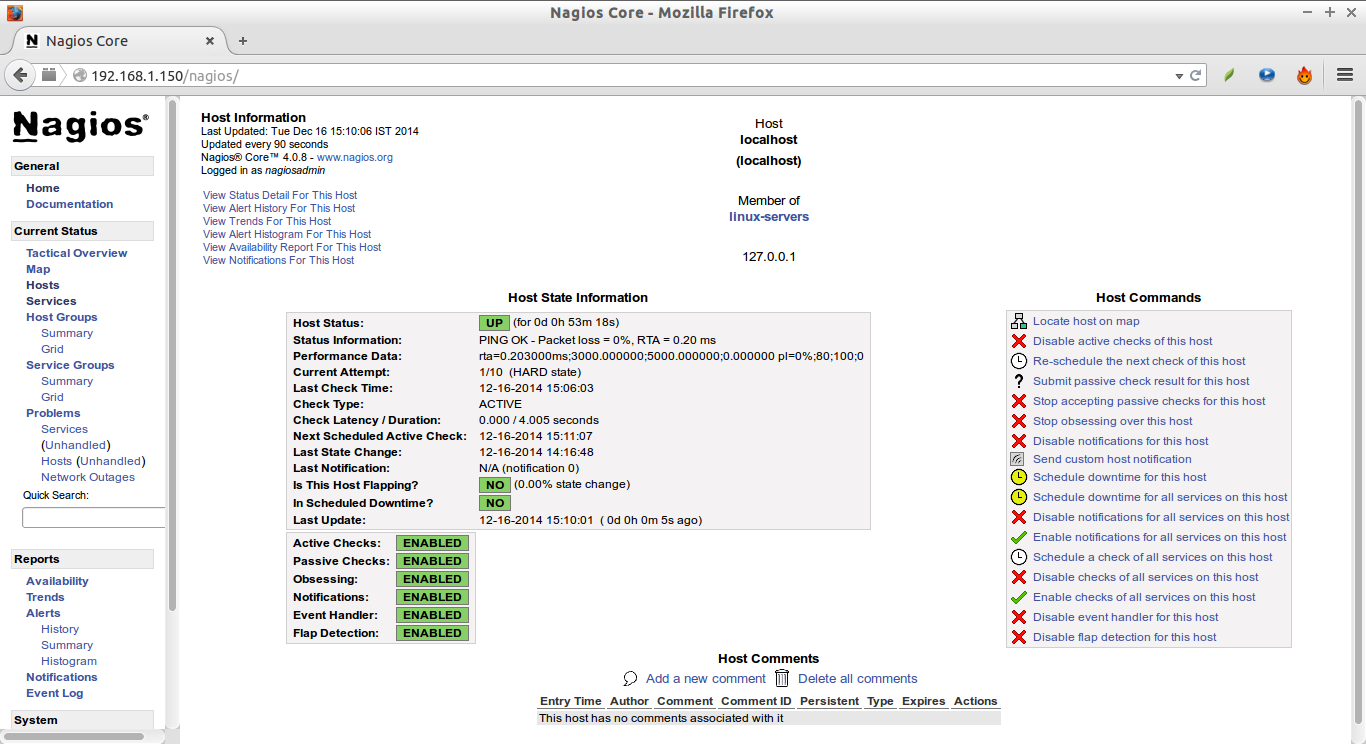How To Install Nagvis On Centos 7
Posted By admin On 06/06/19The Industry Standard in IT Infrastructure Monitoring Purpose This document describes how to install Nagios Core 4.1.1 and Nagios Plugins 2.1.1 on Centos 7 minimal. Install Nagios on Linux. How to Setup Nagios Monitoring Server on CentOS/RHEL 7/6/5. Nagios is an open source, powerful monitoring system. In this tutorial, we will cover the installation of Nagios 4, a very popular open source monitoring system, on CentOS 7 or RHEL 7. We will cover some basic configuration, so you will be able to monitor host resources via the web interface. We will also utilize the Nagios Remote Plugin Executor (NRPE), that will be installed as an agent on remote hosts, to monitor their local resources.
Nagios,Pnp4Nagios & Nagvis installation on centos
20 Steps total
Step 1: Installation of apache
sudo yum install httpd
sudo service httpd start
sudo yum install php php-mysql
Step 2: Download packages & extract
wget https://assets.nagios.com/downloads/nagioscore/releases/nagios-4.3.2.tar.gz
wget https://nagios-plugins.org/download/nagios-plugins-2.2.1.tar.gz
tar -xzf nagios-4.3.2.tar.gz
tar -xzf nagios-plugins-2.2.1.tar.gz
rm -rf *.tar.gz
Step 3: install required packages
yum install httpd php gcc glibc glibc-common gd gd-devel perl unzip -y
Step 4: add users and give rights
/usr/sbin/useradd -m nagios
passwd nagios
/usr/sbin/groupadd nagcmd # Used for Web Interface
/usr/sbin/usermod -a -G nagcmd nagios
/usr/sbin/usermod -a -G nagcmd apache
Step 5: compile the extracted code
./configure --with-command-group=nagcmd
make all
make install
make install-init
make install-config
make install-commandmode
make install-webconf
now setup security for the front end
htpasswd -c /usr/local/nagios/etc/htpasswd.users nagiosadmin
systemctl restart nagios && systemctl restart httpd
Step 6: Install nagios plugins
tar xzf nagios-plugins-2.1.1.tar.gz
cd nagios-plugins-2.1.1
./configure --with-nagios-user=nagios --with-nagios-group=nagios
make
make install
Add Nagios services
chkconfig --add nagios
chkconfig nagios on
Verify the sample Nagios configuration files.
/usr/local/nagios/bin/nagios -v /usr/local/nagios/etc/nagios.cfg
service nagios start
Step 7: Disable selinux
nano /etc/sysconfig/selinux
and set SELINUX=disabled
reboot the machine
Step 8: Add firewall rules
firewall-cmd --zone=public --add-port=80/tcp --permanent
firewall-cmd --zone=public --add-port=444/tcp --permanent
firewall-cmd --zone=public --add-port=25/tcp --permanent
firewall-cmd --reload
systemctl restart nagios
systemctl restart httpd
Step 9: Installation NRPE
yum groupinstall 'Development Tools'
download http://downloads.sourceforge.net/project/nagios/nrpe-2.x/nrpe-2.15/nrpe-2.15.tar.gz
tar -xzf nrpe
cd nrpe
yum install -y gcc glibc glibc-common openssl openssl-devel perl wget
./configure --enable-command-args --with-nagios-user=nagios --with-nagios-group=nagios --with-ssl=/usr/bin/openssl --with-ssl-lib=/usr/lib/x86_64-linux-gnu
make all
make install
make install-xinetd
make install-daemon-config Adobe after effects cc 2015 crack torrent.
nano /etc/xinetd.d/nrpe
and add only_from = your interal ip
service xinetd restart
Step 10: Installation pnp4nagios
yum install rrdtool perl-Time-HiRes rrdtool-perl php-gd
download pnp4 nagios
extract
cd
(https://downloads.sourceforge.net/project/pnp4nagios/PNP-0.6/pnp4nagios-0.6.26.tar.gz)
./configure
make
make all
make fullinstall
chkconfig --add npcd && chkconfig --level 35 npcd on
systemctl reload httpd
mv /usr/local/pnp4nagios/share/install.php /usr/local/pnp4nagios/share/install.php-ori
Step 11: edit nagios.cfg
usr/local/nagios/etc/nagios/.cfg
add / edit
# Bulk / NPCD mode
process_performance_data=1
service_perfdata_file=/usr/local/pnp4nagios/var/service-perfdata
service_perfdata_file_template=DATATYPE::SERVICEPERFDATAtTIMET::$TIMET$tHOSTNAME::$HOSTNAME$tSERVICEDESC::$SERVICEDESC$tSERVICEPERFDATA::$SERVICEPERFDATA$tSERVICECH$
service_perfdata_file_mode=a
service_perfdata_file_processing_interval=15
service_perfdata_file_processing_command=process-service-perfdata-file

How To Install Nagvis On Centos 7
host_perfdata_file=/usr/local/pnp4nagios/var/host-perfdata
host_perfdata_file_template=DATATYPE::HOSTPERFDATAtTIMET::$TIMET$tHOSTNAME::$HOSTNAME$tHOSTPERFDATA::$HOSTPERFDATA$tHOSTCHECKCOMMAND::$HOSTCHECKCOMMAND$tHOSTSTATE::$
host_perfdata_file_mode=a
host_perfdata_file_processing_interval=15
host_perfdata_file_processing_command=process-host-perfdata-file
Step 12: edit commands.cfg
# 'process-host-perfdata' command definition
define command{
command_name process-host-perfdata
command_line /usr/bin/printf '%b' '$LASTHOSTCHECK$t$HOSTNAME$t$HOSTSTATE$t$HOSTATTEMPT$t$HOSTSTATETYPE$t$HOSTEXECUTIONTIME$t$HOSTOUTPUT$t$HOSTPERFDATA$$
}
# 'process-service-perfdata' command definition
define command{
command_name process-service-perfdata
command_line /usr/bin/printf '%b' '$LASTSERVICECHECK$t$HOSTNAME$t$SERVICEDESC$t$SERVICESTATE$t$SERVICEATTEMPT$t$SERVICESTATETYPE$t$SERVICEEXECUTIONTIME$$
}
define command{
command_name process-service-perfdata-file
command_line /bin/mv /usr/local/pnp4nagios/var/service-perfdata /usr/local/pnp4nagios/var/spool/service-perfdata.$TIMET$
}
define command{
command_name process-host-perfdata-file
command_line /bin/mv /usr/local/pnp4nagios/var/host-perfdata /usr/local/pnp4nagios/var/spool/host-perfdata.$TIMET$
}
Step 13: edit templates.cfg
define host {
name host-pnp
action_url /pnp4nagios/index.php/graph?host=$HOSTNAME$&srv=_HOST_'s domain
my $opt_token = 'yoursecret'; # The token from your Nagios services page
Yum Install Nagios
Step 19: edit contacts
define contact {
contact_name slack
alias Slack
service_notification_period 24x7
host_notification_period 24x7
service_notification_options w,u,c,r
host_notification_options d,r
service_notification_commands notify-service-by-slack
host_notification_commands notify-host-by-slack
}
Step 20: additional packages
for some script you need these packages
yum install cpan
cpan : install Net::DNS
yum install php-gd
yum install gd-progs
1 Comment
Nagios Configuration
- Sonoradmle Feb 27, 2019 at 10:33pm
First thank you for great how-to, second, this tutorial will work with CentOS 7 (lastest)?